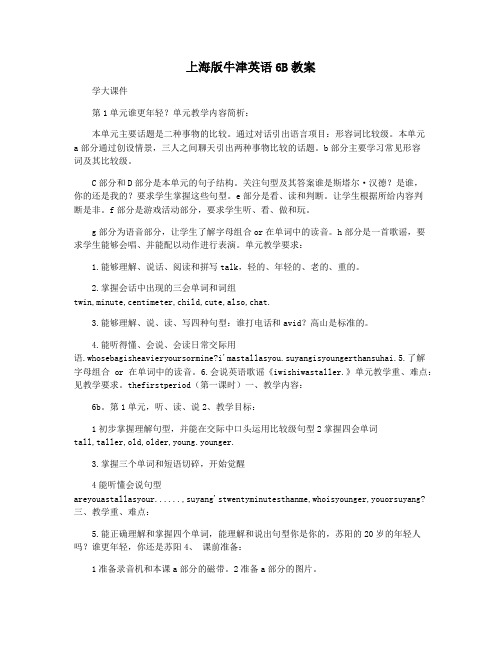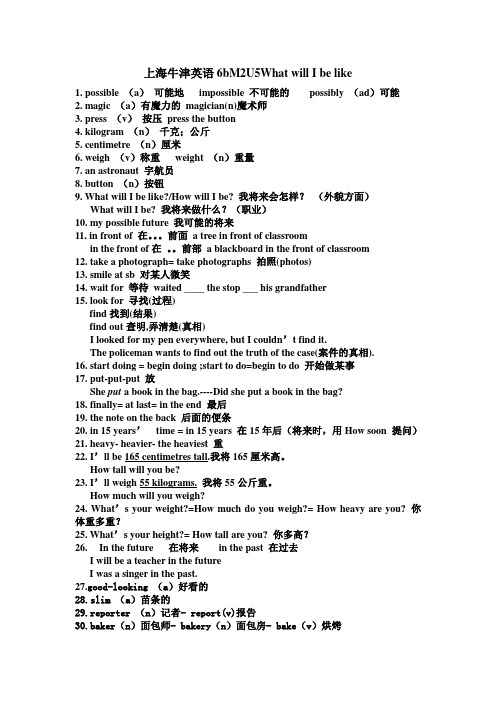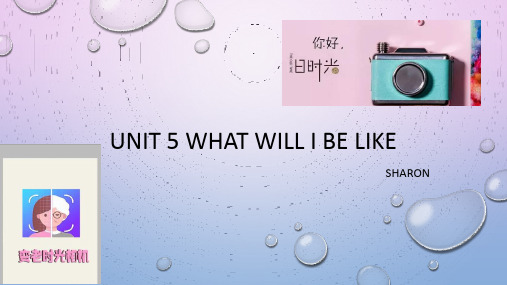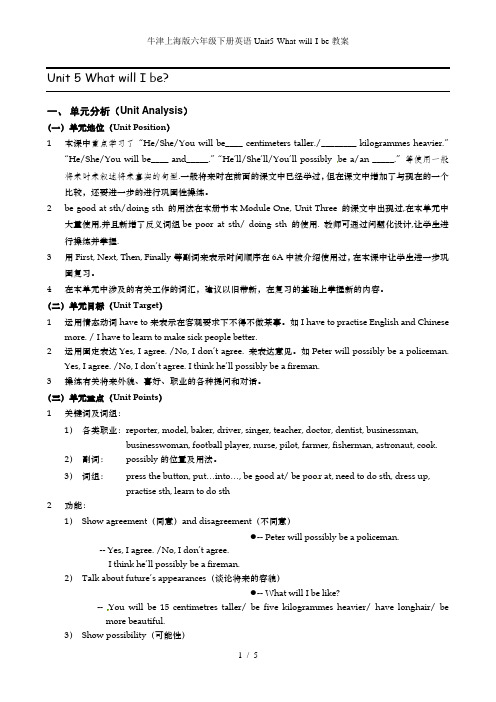上海牛津英语6B课时教案6B M2-U5 P4 What will I be like
牛津英语6b全册教案

牛津英语6b全册教案Unit 6 Planning fr the eeend (第一教时)一教学内容:1能听懂、会说和会读和会拼写单词:pini , plan ,tae part in ,pla2能听懂、会说和会读单词ntest ,Beiing pera sh ,singing ntest ,sprts eeting3能听懂、会说、会读和会写句型:hat are e ging t d …?e are ging t …二教学目标:1能听懂、会说和会读和会拼写单词:pini , plan ,tae part in ,pla2能听懂、会说和会读单词ntest ,Beiing pera sh ,singing ntest ,sprts eeting3能听懂、会说、会读和会写句型:hat are e ging t d …?e are ging t …三教学重点和难点:hat are e ging t d …?e are ging t …句型进行对话四前准备:录音机,挂图五教学过程教学环节教师活动学生活动A Free tal一、师生自由交流1、hih seasn d u lie best ?I lie … h ? Beause it’s … I an …2、D u lie basetball ?es , I dI lie basetball ,t I’ging t pla basetball this afternnB Presentatin1呈现B小图片,have a pini师生通过对话区别现在进行时和一般将时L ,hat are the ding ?The are having a piniD u lie having a pini ?es ,I de’re ging t have a pini this Sunda教师讲解在进行时和一般将时两者的区别或者就让学生说说两者有什么明显的区别2用以上方法教学前四副图3看图,师引导学生对话,学习give a puppet shL at this piture hat is he ging t d this evening ?He is ging t give a puppet sh4依照以上方法教学后四副图,同时要注意人称的变化引起be动词的变化nslidatin1看图完成部分的对话练习。
Unit 5 What will I be like 单元分析以及教学设计 牛津上海版英语六年级下

Unit 5 What will I be like一、单元教学内容与目标1. 语言知识● 核心词汇:possible,future,button, press, back, weigh, kilogram, slim, reporter, baker. singer, agree, possibly, grow, bakery, report, poor,拓展词汇:magic, astronaut, centimeter, good-looking, slim, spacecraft● 词组:1.my possible future 我可能的未来2.stand in front of a magic camera 站在一个神奇的照相机面前3.take a photograph with it 用它照张相4.wait for the red light 等待红灯5.look for the START button 寻找开始键6.read the note on the back 看看在背面的信息7.in 15 years’ time 过15年之后8.will be 165 centimeters tall 将会165厘米高9.will weigh 55 kilograms 体重将有55公斤重10.more beautiful 更美丽(是beautiful的比较级)11.an astronaut 一个宇航员12.be good/poor at sth. 擅长/不擅长于某事be good/poor at doing sth. 擅长于做某事13.wear glasses 戴着眼镜14.put out fires 灭火15.will be tall and strong 将又高又强壮/ will be good-looking 将很好看16. grow bigger 长得更大17. will read and write a lot 将大量地看和读 a lot 大量,许多● 词性转换1.reporter (n.) 记者report (v.) 汇报,报道2.baker (n.) 面包师bake (v.) 烘,烤3.singer (n.) 歌手sing (v.) 唱歌4.possibly (adv.) 可能地possible (adj.) 可能的impossible (adj.) 可能的5. weigh (v.) 称出重量weight (n.) 重量● 知识点:1)Show agreement(同意)and disagreement(不同意)-- Peter will possibly be a policeman.-- Yes, I agree. /No, I don’t agree.I think he’ll possibly be a fireman.2)Talk about future appearances(谈论将来的容貌)-- What will I be like?-- You will be 165 centimeters tall.3)Show possibility(可能性)I’ll possibly be a policeman or a fireman..4) 情态动词have to后面跟动词原形5)用First, Next, Then, Finally等副词来表示时间顺序6) 一般将来时will be2. 语言技能1能运用情态动词have to来表示在客观要求下不得不做某事。
上海初中英语6B教案

上海初中英语6B教案课程目标:1. 能理解和运用本课的核心词汇和句型。
2. 能用英语描述日常生活中的事件和经历。
3. 培养学生的听说读写能力,提高他们的语言运用能力。
教学内容:1. 核心词汇:trip, nature, park, game, swim, story, remember2. 核心句型:What did you do on your trip? I went to a nature park. I played games on the sand. I swam in the pool. I remember seeing beautiful flowers in the park.教学步骤:Step 1: 导入(5分钟)1. 教师与学生进行简单的对话,询问学生假期过得怎么样。
2. 引导学生谈论他们假期的活动,激发学生对旅游话题的兴趣。
Step 2: 新课内容展示(15分钟)1. 教师展示图片,引导学生说出图片中的景点和活动。
2. 教师引导学生学习本课的核心词汇和句型。
Step 3: 小组活动(15分钟)1. 学生分成小组,用英语讨论他们在假期中的活动。
2. 每个小组选择一个最有意义的活动,用英语进行汇报。
Step 4: 听力练习(15分钟)1. 教师播放对话录音,学生听录音并回答问题。
2. 学生互相交换答案,进行口语练习。
Step 5: 阅读理解(15分钟)1. 教师发放阅读材料,学生阅读并回答问题。
2. 学生分享自己的答案,进行口语交流。
Step 6: 写作练习(15分钟)1. 教师发放写作题目,学生按要求进行写作。
2. 学生互相交换作文,进行修改和评价。
Step 7: 总结与作业(5分钟)1. 教师对本节课的内容进行总结,强调重点词汇和句型。
2. 布置作业:用英语写一篇关于假期的作文。
教学评价:1. 课堂参与度:观察学生在课堂上的发言和互动情况,评价他们的参与度。
2. 语言运用能力:通过听力练习、口语交流和写作练习,评价学生的语言运用能力。
上海版牛津英语6B教案

上海版牛津英语6B教案学大课件第1单元谁更年轻?单元教学内容简析:本单元主要话题是二种事物的比较。
通过对话引出语言项目:形容词比较级。
本单元a部分通过创设情景,三人之间聊天引出两种事物比较的话题。
b部分主要学习常见形容词及其比较级。
C部分和D部分是本单元的句子结构。
关注句型及其答案谁是斯塔尔·汉德?是谁,你的还是我的?要求学生掌握这些句型。
e部分是看、读和判断。
让学生根据所给内容判断是非。
f部分是游戏活动部分,要求学生听、看、做和玩。
g部分为语音部分,让学生了解字母组合or在单词中的读音。
h部分是一首歌谣,要求学生能够会唱、并能配以动作进行表演。
单元教学要求:1.能够理解、说话、阅读和拼写talk,轻的、年轻的、老的、重的。
2.掌握会话中出现的三会单词和词组twin,minute,centimeter,child,cute,also,chat.3.能够理解、说、读、写四种句型:谁打电话和avid?高山是标准的。
4.能听得懂、会说、会读日常交际用语.whosebagisheavieryoursormine?i'mastallasyou.suyangisyoungerthansuhai.5.了解字母组合or在单词中的读音。
6.会说英语歌谣《iwishiwastaller.》单元教学重、难点:见教学要求。
thefirstperiod(第一课时)一、教学内容:6b。
第1单元,听、读、说2、教学目标:1初步掌握理解句型,并能在交际中口头运用比较级句型2掌握四会单词tall,taller,old,older,young.younger.3.掌握三个单词和短语切碎,开始觉醒4能听懂会说句型areyouastallasyour......,suyang'stwentyminutesthanme,whoisyounger,youorsuyang?三、教学重、难点:5.能正确理解和掌握四个单词,能理解和说出句型你是你的,苏阳的20岁的年轻人吗?谁更年轻,你还是苏阳4、课前准备:1准备录音机和本课a部分的磁带。
上海版牛津英语6A-M2U5教案(完整资料).doc

【最新整理,下载后即可编辑】Module 2 Places and relativesUnit 5 Open DayFirst PeriodLanguage Targets: 1. Using simple future tense to talk about future events.e.g. Your parents will arrive at two o’clock.2. Using adverbs of timee.g. What will they do first?Ability Targets: 1. Learners learn to communicate with their parents.2. Learners try to express their ideas in English. Emotion Targets:Students can realize how to show somebody theway and communicate with their parents. Language focus: 1. Vocabulary: entrance, choir, noticeboard,programme, parent, first, next, finally, art,craft.2. Function:1) Using simple future tense to talk about future events.Materials: 1. Cassette 6A and a cassette player.2. Workbook 6A pages 28 and 29.3. Students’ book 6A page 32Teaching steps:Second PeriodLanguage Targets: 1. Using the simple future tense to talk about future eventse.g. I’ll be in classroom 6AAbility Targets: 1. Learners learn to cooperate with each other.2. Learners try to express their ideas in English. Emotion Targets:Students will welcome their parents on the OpenDay. This activity will make themcommunicate with each other. Language focus: 1. New words: the ground floor, the first floor, thesecond floor, the third floor, gym,different.2. Function:1) Using the simple future tense to talk about future events.Materials: 1. Cassette 6A and a cassette player2. Students’ book 6A page 333. Workbook 6A pages 31.Teaching steps:Third PeriodLanguage Targets: 1. Using the simple future tense to talk about future events.e.g. What will our parents do first?2. Using formulaic expressions to begin and end aletter.e.g. Dear …; YoursAbility Targets: 1. Learn to write an invitation.2. Learners try to express their ideas in English. Emotion Targets:Students can learn to express their ideas throughthe letter.Language focus: 1. Vocabulary: invitation, date, receive2. Function:1) Using the simple future tense to talk about future events.e.g. What will our parents do first? Materials: 1. Cassette 6A and a cassette player2. Students’ book 6A page 343. Workbook 6A pages 32 and 34.Teaching steps:Fourth PeriodLanguage Targets: 1. Using the simple past tense to talk about past activities.e.g. The parents arrived at Rose Garden School at two o’clock.Ability Targets: 1. Identify details that support a main idea.2. Learners try to express their ideas in English. Emotion Targets:Students learn to communicate with their parents. Language focus: 1. Vocabulary: arrive-arrived, visit-visited,look-looked, listen-listened,have-had2. Function:1) Using the simple past tense to talk about past activities.Materials: 1. Cassette 6A and a cassette player.2. Students’ book 6A page 35Teaching steps:。
牛津上海版英语六年级第二学期:Unit 5 What will I be like 学案设计(无答

Unit 5 What will I be like?【学习目标】1.能正确理解和运用本课出现的重要单词和短语。
2.读懂课文,能掌握主要信息和细节信息,并能介绍相关内容。
【学习重难点】1.正确理解和运用本课出现的重要单词和短语。
2.掌握主要信息和细节信息,并能介绍相关内容。
【学习过程】1.possible (a)可能地。
impossible:_______________________。
possibly (ad):_______________________。
2.magic (a)有魔力的。
magician(n) :_______________________。
3.press (v)按压。
press the button:_______________________。
4.kilogram (n)千克;公斤。
5.centimeter (n)厘米。
6.weigh (v)称重。
weight (n)重量:_______________________。
7.an astronaut 宇航员。
8.button (n)按钮。
9.What will I be like? /How will I be? 我将来会怎样?(外貌方面)What will I be?_______________________。
10.my possible future. 我可能的将来。
11.in front of 在……前面。
A tree in front of classroom._______________________。
in the front of在……前部。
A blackboard in the front of classroom._______________________。
12.take a photograph= take photographs 拍照(photos).13.smile at sb. 对某人微笑。
上海牛津英语6bM2U5What will I be like

上海牛津英语6bM2U5What will I be like1. possible (a)可能地impossible 不可能的possibly (ad)可能2. magic (a)有魔力的magician(n)魔术师3. press (v)按压press the button4. kilogram (n)千克;公斤5. centimetre (n)厘米6. weigh (v)称重weight (n)重量7. an astronaut 宇航员8. button (n)按钮9. What will I be like?/How will I be? 我将来会怎样?(外貌方面)What will I be? 我将来做什么?(职业)10. my possible future 我可能的将来11. in front of 在。
前面a tree in front of classroomin the front of在。
前部a blackboard in the front of classroom12. take a photograph= take photographs 拍照(photos)13. smile at sb 对某人微笑14. wait for 等待waited ____ the stop ___ his grandfather15. look for 寻找(过程)find找到(结果)find out查明,弄清楚(真相)I looked for my pen everywhere, but I couldn’t find it.The policeman wants to find out the truth of the case(案件的真相).16. start doing = begin doing ;start to do=begin to do 开始做某事17. put-put-put 放She put a book in the bag.----Did she put a book in the bag?18. finally= at last= in the end 最后19. the note on the back 后面的便条20. in 15 years’time = in 15 years 在15年后(将来时,用How soon 提问)21. heavy- heavier- the heaviest 重22. I’ll be 165 centimetres tall.我将165厘米高。
六年级英语下册Unit5《WhatwillIbelike》教案2牛津上海版(一起)

本牛津教材 6B Module 2 Chanes Unit 5 What willIbe like? 的第一。
本班学生体水平好,学生英学趣厚,基相扎。
部分学生思活,敢于勇敢表自己。
但因为学的深入和能力的差别,小部分学生在听写各方面都存在明的不足。
本采纳任型教课法。
在上前半段,通演示文稿件,直地引出新,巩固操。
在具了基以后,睁开听。
因为本的内容的都是直形象的人物容颜,因此本的一个主即是学生喜的画人物和明星人物。
学生些画明星及影明星极熟习并且感趣,就本睁开烈的供给了可能性。
在堂上,学生看到了喜的明星,他愿意用自己的言去表达,愿意从教材中掘相关信息,进而在不知不中,操了知会的句型。
同,通未来的容颜,身高体重生的化,引学生生活,健康食,并立正确的美;培育学生的美情味;通未来的事情,激学生美好生活的神往。
前身:看卡通片,激学生趣,入正。
通看画片《灌能手》片,吸引学生注意力。
展现片中人物的照片并通卡通人物木花道,流川,赤木晴子形象引出复内容:What does he/she look like ? ( 他得什么? ) 学生提回答 3 个卡通人物的容颜,达到复旧,引出新的目的。
T : Do you like to watch cartoons ?Ss : Yes .T : Can you name some famous cartoons you like ?Ss : Ninja Turtle , Detective Conan , Dragon Balls and Slan Dunk .T : That ’s good . Next let’s watch a period of cartoon film , and then answer myquestions about it .(After playing of the film .)T:Who is your favourite cartoon character ?S1: Yingmu HuadaoS2: Liuchuan Feng .S3: Chinu QingziT : Pretty good . What does Yingmu Huadao look like ? What does Liuchuan Fenglook like ? What does Chimu Qingzi look like ?Ss: He is tall . He has red hair . He has short hair. He is strong . She has longhair . She is beautiful⋯T: You all have done a good job !比卡通人物,引出新。
新牛津上海版六年级下册《unit 5 what will i be like》教学设计(精品).doc

《What will I be like?》教学案例分析一、教学背景1、学情分析预备(6)班是一个普通班,共有学生39人。
学生英语基础一般,且由于各个地区的英语教学水平和教学要求不同,学生们的英语水平比较参差,尤其是一部分来自乡校的学生,英语口语比较差。
但总体来说,通过小学的学习,学生们都有了一定的语言知识和语言技能,已初步适应初中的英语教学要求,对教师的教学方法也已习惯。
大多数学生踏实认真,喜欢英语,求知欲强,有着强烈的愿望要把英语学好。
根据教材和学生实际,本节课我的教学目标如下:知识与技能:学习并掌握词汇,了解课文大意,学会描述他人。
过程与方法:学生通过听、朗读和说的练习,掌握将来时的表达,然后通过相互合作,学会描述某人的外貌和可能从事的工作,并学会针对他人的想法表达自己的意见。
情感态度与价值观:通过本课的学习,懂得树立理想的重要性,从而培养健康的价值观和理想观。
2、教学设计思想我校使用的教材是《Oxford English》(上海版)6B,这套教材是根据最新制订的英语课程标准所编写的,今年也是首次采用。
教材的最大优点是便于学生记忆和扩大语言材料,开阔思路,提高兴趣,培养学生的语言交际及创新能力。
本课内容是牛津英语初中预备年级第二学期第5单元的读、讲部分。
本单元主要是对上学期已出现过的将来时态进行巩固。
在教学的过程中,强调对于将来时的掌握及输出。
在导入部分,通过歌曲和对话的形式巩固和复习之前已学习的知识,以期达到以旧带新的效果。
在新授课的部分,通过词汇学习、朗读练习、听力训练和小组对话等任务,完成对本课词汇、对话和语段的学习。
在拓展部分要求学生运用课上学习的知识,通过小组讨论的形式,设想他人的未来,并进行理想教育。
二、教学过程叙述1、创设氛围,引入课题课程的一开始,我播放一首名为“What will I be like?”的英文歌曲作为导入,并要求所有的同学跟着音乐一起大声的唱起来。
有趣的歌词、简单又不失琅琅上口的节奏,让同学们都放开嗓门,开心地唱了起来,有的学生还和着歌曲的拍子打起了节奏。
2018牛津上海版六下Unit 5《What will I be like》word教案1

2018牛津上海版六下Unit 5《What will I belike》word教案1单元分析(Unit Analysis)(一)单元地位(Unit Position)1 本课中重点学习了“He/She/You will be____ centimeters taller./___ _____ kilogrammes heavier.”“He/She/You will be____ and_____.”“H e’ll/She’ll/You’ll possibly be a/an _____.”等使用一样今后时来叙述今后事实的句型.一样今后时在前面的课文中差不多学过,但在课文中增加了与现在的一个比较,还要进一步的进行巩固性操练。
2 be good at sth/doing sth 的用法在本册书本Module One, Unit Three 的课文中显现过,在本单元中大量使用,同时新增了反义词组be poor at st h/ doing sth 的使用. 教师可通过咨询题化设计,让学生进行操练并把握.3 用First, Next, Then, Finally等副词来表示时刻顺序在6A中被介绍使用过,在本课中让学生进一步巩固复习。
4 在本单元中涉及的有关工作的词汇,建议以旧带新,在复习的基础上把握新的内容。
(二)单元目标(Unit Target)1 运用情态动词have to来表示在客观要求下不得不做某事。
如I have to practise English and Chinese more. / I have to learn to make sick pe ople better.2 运用固定表达Yes, I agree. /No, I don’t agree. 来表达意见。
如P eter will possibly be a policeman. Yes, I agree. /No, I don’t agree. I thi nk he’ll possibly be a fireman.3 操练有关今后外貌、喜好、职业的各种提咨询和对话。
上海牛津英语6B Unit 5What will I be like Page 33pptx

• e. g.: 他有可能借钱给你。
• He can possibly lend you the money.
• e.g.: You may possibly get a new job. • 你也许能得到一份新工作。
[中考链接]
• Plenty of people around may not be as smart as we are, but they are better at sports. Or they may not be as good-looking, but they have more money. It is
•
pressure n. 压力
• e.g.: 请不要给我太大的压力。
• Please don’t put too much pressure on me.
KEY POINTS:
• 6. back n.背后,背部;(物体的)背面 • e. g. : 我们在树下仰面躺着。
• We lay on our backs under the tree.
CLASS REVIEW:
• Talk about your possible future. • e.g.: I’ll be taller and stronger in 15 years’ time. • I’ll be 180 centimetres tall. • I’ll weigh 72 kilograms. • I’ll be more handsome. • I’ll be a bank clerk.
UNIT 5 WHAT WILL I BE LIKE
SHARON
牛津上海版英语六年级下册Unit5WhatwillIbelike单元分析以及优秀教学案例

(一)导入新课
在牛津上海版英语六年级下册Unit5 "What will I be like?"的导入环节,我采取了以下措施:
1.我利用多媒体展示了一些未来职业的图片,如宇航员、律师、艺术家等,激发学生的好奇心和兴趣。然后,我提问学生:“What do you want to be in the future?”让学生自由发言,分享自己的梦想和期望。
(三)小组合作
我运用小组合作策略,培养学生的团队合作能力和综合语言运用能力。
1.我将学生分成小组,每组成员共同讨论并表演未来的职业规划,通过合作完成任务,提高学生的团队合作能力。
2.我设计了一些小组互动活动,如小组问答、小组竞赛等,激发学生的竞争意识和团队合作精神,促进学生之间的交流和合作。
3.我还鼓励学生在小组内进行互评和自我评价,培养学生的批判性思维和自我反思能力,提高学生的综合语言运用能力。
(三)情感态度与价值观
在教学过程中,我注重引导学生树立正确的价值观,设定以下情感态度与价值观目标:
1.学生能够通过讨论和分享,认识到每个人对未来有不同的梦想和期望,培养尊重和理解他人的态度。
2.学生能够积极思考未来的职业规划,激发对未来的向往和追求,培养积极向上的生活态度。
3.学生能够在交流和合作中,学会倾听、理解和尊重他人,培养良好的人际交往能力和社会适应能力。
2.问题导向的有效性:我提出了一系列问题,引导学生进行思考和探究,激发学生的思维和解决问题的能力。通过问题导向,学生能够更深入地理解和学习本节课的核心内容,培养学生的批判性思维和解决问题的能力。
3.小组合作的互动性:我采用了小组合作的形式,让学生进行讨论和表演,培养学生的团队合作能力和综合语言运用能力。在小组合作中,学生能够积极参与,互相交流和合作,提高了学生的学习效果和综合语言运用能力。
上海牛津英语6b教案

上海牛津英语6b教案【篇一:上海版牛津英语6b教案 module 1 the naturalelements】module 1 the natural elementsunit 1 firethe first periodcontent: p2language focus:using the simple present tense to express preferencesusing adjectives to describe an objectasking ?how? questions to find out various kinds of specific information about an objectmaterials: slides, cassette and a cassette player教后感:通过这一课时的学习,主要让学生在会话中运用所学的知识点和词组,把理论和实际很好的结合起来,而且学生对这种情景教学也较感兴趣,对教学内容的掌握也较另人满意。
例如cooked meat和raw meat的掌握,cook的名词和动词词性等。
second periodcontent: p3language focus:using the simple past tense to talk about activitiesusing adverbials to express timeusing the simple past tense to express past conditionsmaterials: pictures, cassette and a cassette player会话学生基本能较好的掌握这些知识点。
在此基础上让学生读懂课文,更深一层次的了解课文内容,再通过复述课文提升他们的英语学习能力和口头表达能力。
third periodcontent: p4language focus:using adjectives to make comparisonsasking ?wh? questions to find out information about somethingmaterials: slides, cassette and a cassette player教后感:本课的重点句型为like…betterthan,―charcoal‖、―electricity‖两个单词的拼写较难,可分音节教学生拼写。
牛津上海版六年级下册英语Unit5-What-will-I-be教案

Unit 5 What will I be?一、单元分析(Unit Analysis)(一)单元地位(Unit Position)1 本课中重点学习了“He/She/You will be____ centimeters taller./________ kilogrammes heavier.”“He/She/You will be____ and_____.”“He’ll/She’ll/You’ll possibly be a/an _____.”等使用一般将来时来叙述将来事实的句型.一般将来时在前面的课文中已经学过,但在课文中增加了与现在的一个比较,还要进一步的进行巩固性操练。
2 be good at sth/doing sth 的用法在本册书本Module One, Unit Three 的课文中出现过,在本单元中大量使用,并且新增了反义词组be poor at sth/ doing sth 的使用. 教师可通过问题化设计,让学生进行操练并掌握.3 用First, Next, Then, Finally等副词来表示时间顺序在6A中被介绍使用过,在本课中让学生进一步巩固复习。
4 在本单元中涉及的有关工作的词汇,建议以旧带新,在复习的基础上掌握新的内容。
(二)单元目标(Unit Target)1 运用情态动词have to来表示在客观要求下不得不做某事。
如I have to practise English and Chinesemore. / I have to learn to make sick people better.2 运用固定表达Yes, I agree. /No, I don’t agree. 来表达意见。
如Peter will possibly be a policeman.Yes, I agree. /No, I don’t agree. I think he’ll possibly be a fireman.3 操练有关将来外貌、喜好、职业的各种提问和对话。
- 1、下载文档前请自行甄别文档内容的完整性,平台不提供额外的编辑、内容补充、找答案等附加服务。
- 2、"仅部分预览"的文档,不可在线预览部分如存在完整性等问题,可反馈申请退款(可完整预览的文档不适用该条件!)。
- 3、如文档侵犯您的权益,请联系客服反馈,我们会尽快为您处理(人工客服工作时间:9:00-18:30)。
While-task(IV)
Piggy Bank (Listen and write2-1~2)
Play the cassettes and fill in the blanks
To let sts. identify details that support a main idea
Play the recordings and let sts. read after the text
To correct sts.’pronunciation and intonation
While-task(III)
Piggy Bank (About you)
Ask the sts. to talkaboutthemselves
Post-task
*Gold Mine (Read and say)
Ask the sts. to read the dialog and guess the jobs
To check sts. comprehension
Consolidation
WB P31 nd P34
Tocheck sts. comprehension.
Teaching Procedures:
Stages
Teacher’sActivity
Purpose
Pre-task
Ask sts. some questions
To elicit the topic
While-task (I)
Piggy Bank (Think and say2-1~2) (Listen and guess) (Look and say)
Module 2 Changes
Unit 5 What will I be like?
Teaching objectives:
By the end of the class, the students will be able to
1.write about their own abilities and preference
Teach the structure‘be good at’and‘be poor at’.
Have the sts. practise the structure
To put the structures into practice
Play the recordings and let the sts. guess the jobs
To let sts. listen for specific information
Have the sts. make a dialog with jobs
To let sts. prectise what they’ve learnt
While-task(II)
Piggy Bank (Look and read4-1~4)
2.to help the students to use modal verbs to express obligation, e.g., I have to practise English and Maths more.
Teaching aids: ppt; SB; WB; cassettes
e the simple future tense to talk about future events
e modal verbs to express obligation
Teaching difficulty and focus:
1.to help the students to use the simple future tense to talk about future events, e.g., I’ll possible be a policewoman or a teacher.
反思
